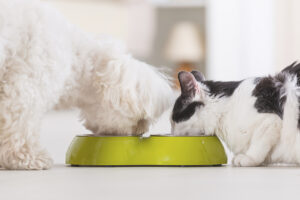
Pet hydration is essential all year long, but it is at its most important during the hot summer months.
When temperatures rise, it’s not just humans who feel the heat — our pets are equally vulnerable to dehydration and heat-related illnesses. Proper pet hydration is crucial, especially during the hot months, to keep your furry friends healthy, happy, and active. Whether you have a playful pup or a laid-back cat, ensuring they get enough fluids can make all the difference in their overall well-being.
Why Pet Hydration Is So Important
Water is vital for every part of your pet’s body. It helps regulate body temperature, aids digestion, cushions joints, and keeps organs functioning properly. Dehydration in pets can quickly escalate to dangerous conditions like heatstroke, kidney failure, or even death if left unchecked. Signs of dehydration include lethargy, dry gums, sunken eyes, loss of appetite, and thick, sticky saliva. Staying on top of pet hydration prevents these issues and promotes vibrant health.
How Much Water Does Your Pet Need?
A general guideline is that dogs and cats should drink about one ounce of water per pound of body weight each day. For example, a 10-pound cat should consume approximately 10 ounces of water daily. However, factors like activity level, age, diet, and weather conditions can increase your pet’s water requirements, making it essential to monitor their intake closely during the hotter months of the year.
Practical Tips to Improve Pet Hydration
- Keep Water Bowls Full and Fresh: Ensure water bowls are always clean and topped up with cool, fresh water. Refill them several times a day and place multiple water sources throughout your home and yard.
- Consider a Pet Water Fountain: Many pets prefer running water. A pet water fountain can encourage both dogs and cats to drink more frequently, improving pet hydration naturally.
- Offer Hydrating Treats: Incorporate water-rich snacks into your pet’s diet, like ice cubes made from low-sodium broth, watermelon chunks (for dogs), or even ice chips. Always verify that treats are safe and pet-friendly.
- Feed Moist Food: Switching to or incorporating wet food into your pet’s diet can boost their water intake. Wet food contains significantly more moisture than dry kibble.
- Bring Water on Walks and Outings: Carry a portable water bowl or a pet water bottle when heading outdoors with your dog, ensuring they stay hydrated during walks, hikes, and playtime.
- Provide Shaded Rest Areas: Keeping your pet cool in shaded or air-conditioned spaces helps reduce water loss from excessive panting and heat exposure.
What to Do If You Suspect Dehydration
If you notice any symptoms of dehydration, such as lethargy or dry gums, try offering water immediately and move your pet to a cooler area. For severe symptoms, seek veterinary care as soon as possible. Early intervention is key to preventing serious health complications.
Prioritize Pet Hydration All Year Long
Ensuring proper pet hydration is one of the most important things you can do for your dog or cat during the hot seasons. By providing ample water, staying vigilant, and taking preventive measures, you’ll help your furry companion beat the heat and enjoy a safe, comfortable season.
Trust Maryland Veterinary Surgical Services With Your Companion’s Health
Your companion’s health is important, and the team at MVSS is ready to provide the best care possible for your furry family. We are dedicated to combining comprehensive exams and assessments with informative and honest discussions of your companion’s care. Once we have worked with you to decide on the best course of action for your dog, our professionals will use their surgical expertise to work towards the goal of giving your companion an active and pain-free life. We are proud to serve loyal companions in Catonsville and Baltimore. To learn more about our services, give us a call at 410-788-4088 or visit us online. For more information and tips for dog health, follow us on Facebook and Pinterest.
